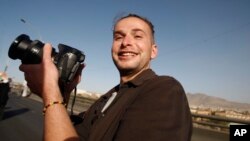As colleagues mourn the death of Luke Somers, an American photographer killed by al-Qaida in the Arabian Peninsula during a U.S. rescue attempt Saturday, they say his death will have a lasting effect on journalism in Yemen. Analysts say foreigners in Yemen also should be increasingly cautious, because the Islamic State’s well-publicized murders have increased the value of kidnappings in other parts of the world.
As tragedies pile up in Yemen, a country beleaguered by internal wars, crushing poverty and al-Qaida in the Arabian Peninsula (AQAP), it’s impossible to mourn one life at a time, said Sarah Ahmed, a sociology researcher in Yemen who worked with Luke Somers.
But Somers’ murder will not soon be forgotten in Yemen, she added.
“When I think of Luke, the only thing I think about is of him smiling and taking public transportation and holding his camera and accompanying us at every single protest. Playing around with kids, and saying hello to this person and that person,” said Ahmed.
His photography was notable because he was more interested in the lives of regular people than in following Western media trends, which tend to favor terrorism-related stories from Yemen, recalled Ahmed.
“He worked hard to take pictures, documenting daily life, the beauty he saw in the people and in the country and in the food. He certainly fell in love with the country,” she said.
Other colleagues say he rarely worked with other foreign journalists calling him a “a bit of a lone wolf.”
Yemen has long been known for kidnappings of both locals and foreigners for ransoms. But AQAP has never captured and killed a foreign reporter before.
Somers’ death impacts all reporters in Yemen said Tom Finn, a journalist, who, like Somers, covered Yemen’s 2011 uprising and recently wrote a tribute to Somers for the online news organization Middle East Eye.
“I guess it just means now that the lifestyle of freelance journalists in Yemen is not once what it was anymore. I think that’s sad because it will affect the way we report on Yemen. Luke was one of the people who, as I tried to say in the article, he wasn’t interested in politicians, he wasn’t interested really in press conferences - you know official events,” said Finn.
The kind of stories Somers most cared for - featuring on the ground personal reporting - will be harder to find now, as activities once deemed safe, like spending hours on the streets or zipping around town on a motorcycle, are now far more dangerous, said Finn.
And that danger is increasing for foreigners in Yemen and other parts of the world said Yan St. Pierre, the CEO of Berlin-based security firm MOSECON, partially because the Islamic State in Syria and Iraq has increased the amount of publicity surrounding kidnappings with shocking video releases.
“They’re just using the bigger trend right now to promote what they are already doing. The ISIS films and the reaction to them are definitely inspiring at least a coming out for other groups to say ‘Hey, we have hostages and we want more,’” said St. Pierre.
But St. Pierre noted that Somers’ murder is not an imitation of killings of Western journalists and aid workers by the Islamic State, because Somers and his fellow hostage South African teacher Pierre Korkie were shot by militants during a botched rescue attempt, not executed for cameras.
Al-Qaida also has different tactics, motivations and goals, according to St. Pierre.
In Yemen, Somers’ former colleague Ahmed said the way the U.S. and Yemeni governments are fighting al-Qaida, with drone strikes that may kill militants, but certainly kill families, is strengthening al-Qaida by terrorizing the people.
“I still think it's not too late to get rid of AQAP in a fair, righteous and decent way. The key to me is development, is basic services in these remote areas where human beings are basically striving to stay alive. And, again, they are being bombarded without even understanding why,” said Ahmed.
Somers was held for about a year in Yemen before his capture was made public with a video threatening to kill him last week. A previous rescue attempt by the U.S. military saved seven other hostages, but in the most recent rescue attempt Somers and Korkie were shot as militants fled. They both died shortly after.





